Caroline, Her Sisters And The Sea
by Charles A. Hooey
Magnificent, and oh so dangerous ... the
English Channel lapped not far from their home in Portsmouth,
allowing Caroline Hatchard
and her four sisters to watch harbour action at will. They
could see trade and commerce flourish in peacetime and sleek,
powerful
monsters of the Royal Navy sweep by in troubled times. For
all the Hatchard girls save Caroline, the sea would have its
fateful
way.
In 1906, times were peaceful enough when Caroline returned
home to sing for her many friends in Portland Hall. They had
some
en masse to honour one of their own. Most knew she had sung
her way onto the stage of the Royal Opera as the Company's
FIRST
native-born and trained soprano to do so.
Parents George and Lilian were non-musical as was middle daughter
Alice, but each of the other girls had an exceptional musical
talent burning within. Strange, isn't it? Lilian, Jr. chose
piano, Ethel the violin, Caroline sang and baby Isabel...Bell,
she wanted
to sing like Carrie. Papa George, a supervisor for the telegraph
authority, perhaps found work easier than evenings at home
with his lively brood.
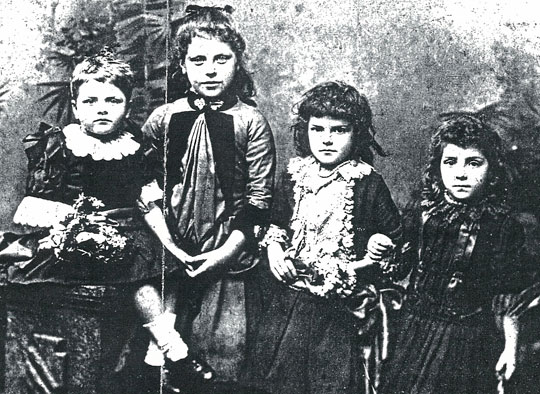
L to R: Caroline, Lilian Jr, Ethel & Alice.
Born on 12
October 1883, Caroline Gertrude was truly most amazing for
she loved to sing and to entertain. In no time at all,
most in Portsmouth knew of her prodigious talent. But this
was Victorian
England with its dictates. Middle class young ladies had no
business being on stage and any skill leading in that direction
was to
be quickly squelched. Fortunately the Hatchards did not subscribe
to such nonsense and advised the girls, "Go for the top
prize, always!"
At
the tender age of seventeen, Caroline headed for the Royal
Academy of Music in London, thanks to her parents and a wealthy
family friend. She entered the famous rabbit warren on Tenterden
Street on 24 September 1900 to find Agnes Larkcom, a highly
regarded vocal teacher, waiting. Madame's fierce demeanor barely
masked
her heart of gold; she only wanted her charges to do well.
After earning both the Rutson and Melba Prizes, Caroline acquired
experience
singing alongside the likes of John Harrison and Robert Radford
at RAM-arranged concerts in Queen's Hall, where in 1904, she
made her professional debut at a Proms Concert.
At the Royal Opera she appeared, auburn-haired, svelte and
with an impish smile, creating an "ideal" Dewman
in Hansel
und Gretel. A month later, her Shepherd in Tannhäuser was
truly "charming." Roles in Armide, Traviata and Faust followed.
Early in 1908, she assumed four parts in what was undoubtedly
the greatest musical happening of her time...Wagner's Ring Cycle
in its English language Première.
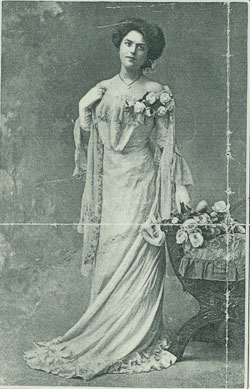 After debuting in London as a soprano in 1885, Liza Lehmann
had proceeded to carve a nice niche for herself, but in 1894
she
abandoned all that, ostensibly to marry Herbert Bedford. Actually
she wished to compose music. It was a wise decision for in
just two years, she had crafted a song cycle, "In a Persian
Garden," that had instant appeal.
After debuting in London as a soprano in 1885, Liza Lehmann
had proceeded to carve a nice niche for herself, but in 1894
she
abandoned all that, ostensibly to marry Herbert Bedford. Actually
she wished to compose music. It was a wise decision for in
just two years, she had crafted a song cycle, "In a Persian
Garden," that had instant appeal.
In the autumn of 1906, Liza set out to enlist young singers
to tour Britain to sing her music, including Persian Garden,
which everyone was eager to hear. Caroline joined contralto
Palgrave Turner, tenor Albert Watson and baritone Peter Dawson
to form
Lehmann's Concert Party and off they went to places like Exeter
and Torquay and to Plymouth, where Caroline gave "a beautiful
and sympathetic rendering of `I sent my soul' and `each morn
a thousand roses brings,' imparting deep feeling into the closing
line, `but where leaves the rose of yesterday?'" Her encore, "If
no one ever marries me" was amusing, especially to those
who knew she had slipped away in August to marry agronomist
Robert Langford. They would have two sons, Peter, born in 1915,
and Ewen, eight years later.
She enjoyed Royal Opera camaraderie while gaining oceans of
experience...so why, was she not offered key roles? Soon she
came to understand,
perhaps bitterly, that major parts were reserved for singers
from Italy, France and Germany, according to public demand.
Prejudice reigned. "If we're paying top prices, we don't want to hear
locals," patrons indignantly proclaimed. Unfortunately
this repressive attitude prevailed for years.
In 1910, she found a solution when she met charismatic Thomas
Beecham, hell bent on thrusting grand opera upon his fellow
Britons, whether they wanted it or not. His "opera-comique" style
involved light and tuneful, small-scaled operas given in medium-sized
halls throughout the land. If he misjudged, family funds would
see him through. He needed young English singing talent so
Caroline signed up.
Offenbach's Tales of Hoffmann launched his season at
His Majesty's Theatre, London, on 12 May 1910. Caroline's chance
came twelve days later when she sang the saucy colleen Kitty
in Sir Charles Stanford's comic opera, Shamus O'Brien.
While saving her beleaguered hero, she sang charming songs
in an opera packed with folk tunes.
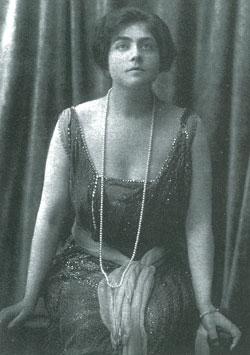 Noticing
a casting weakness in his Hoffmann, Beecham
decided Caroline would make a better Olympia. Later she recalled
a rehearsal, "I
was standing frozen and unable to look at the conductor, singing
contentedly when the music suddenly began to fall apart! I felt
a sudden sense of panic. Then I heard the doll's mechanism being
rewound and almost immediately, the music underwent a change.
There was more zip and I could again detect a clear beat to follow.
I stole a glance at the podium and saw Beecham had appeared to
relieve his floundering colleague." Joining the cast on
7 June, she sang Olympia 22 times that summer.
Noticing
a casting weakness in his Hoffmann, Beecham
decided Caroline would make a better Olympia. Later she recalled
a rehearsal, "I
was standing frozen and unable to look at the conductor, singing
contentedly when the music suddenly began to fall apart! I felt
a sudden sense of panic. Then I heard the doll's mechanism being
rewound and almost immediately, the music underwent a change.
There was more zip and I could again detect a clear beat to follow.
I stole a glance at the podium and saw Beecham had appeared to
relieve his floundering colleague." Joining the cast on
7 June, she sang Olympia 22 times that summer.
Beecham's initiative produced the première of Strauss's Feuersnot in
English on 9 July with Caroline as Walpurg, wife of the Burgomaster
who was portrayed with ease by the ubiquitous Radford. It caught
the fancy of the critics and aficionados but music lovers in
general stayed away.
Her next experience came at the Whitney Theatre, Aldwych in
the musical Baron Trenck, which opened on 19 May 1911.
She was a bewitching Countess Lydia at her wit's end coping
with
a dallying Trenck. The press said (she) "acts interestingly
but her voice, admirably and so easily used by turns for comedy,
tenderness and passion, would win its way anywhere."
She sang in Verdi's Requiem in Norwich Cathedral on
28 March 1912 ... grimly ominous for in Southampton, 300 kilometres
away,
happy folk were boarding the Titanic.
After her starry run with Beecham, the next step was to join
Ernst Denhof's upcoming tour, especially as it had Beecham's
backing. In the fall of 1913, they set out but Denhof's inadequate
promotional skills quickly led to half-empty houses. To avert
disaster, TB rushed to the scene and shut operations down while
he devised solutions. Ten days later the tour resumed in Sheffield
with Beecham's people firmly in charge. It became a resounding
success!
Caroline was handed a real plum, the role of Sophia when Richard
Strauss's Der Rosenkavalier was given its English language
première as The Rose-Bearer in Birmingham on
20 September 1913. She sang with "just the ingenuous charm
needed" as Sophia, appearing in the opera thirteen times
in total. The series enabled more Britons to experience Strauss's
unique music than the British Première at Covent Garden
in eight performances the previous January. She sang also the
Queen of the Night in Mozart's Magic Flute, Eva in Wagner's Mastersingers and
the Forest Bird in Siegfried.
At
one point, she felt a year in Italy would have yielded much,
the thought being that intense opera studies would have enabled
her to springboard onto world stages.
Enticing, but she had singing engagements upcoming...children she wanted...and
ominous war clouds on the horizon...home was the only option.
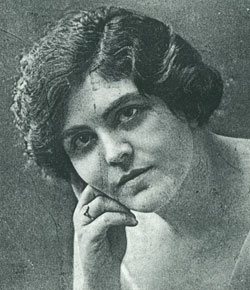 In 1914, she discovered the exotic, richly-textured music of Samuel Coleridge-Taylor
singing excerpts of his Hiawatha and A Tale of Old Japan in Bournemouth.
Three years earlier the composer had given an Alfred Noyes poem such vividly
coloured music that he remarked to his wife, "We'll have a motor car yet,
Jess, out of `A Tale of Old Japan'." Sadly, it was not to be, for
C-T died in 1912, aged 37. At his funeral, friend bass Julien Henry sang the
composer's own "When I am dead, my dearest." Caroline never forgot
C-T's music and chose Hiawatha as the pièce de resistance for
her stage farewell in Liverpool on 17 November 1931.
In 1914, she discovered the exotic, richly-textured music of Samuel Coleridge-Taylor
singing excerpts of his Hiawatha and A Tale of Old Japan in Bournemouth.
Three years earlier the composer had given an Alfred Noyes poem such vividly
coloured music that he remarked to his wife, "We'll have a motor car yet,
Jess, out of `A Tale of Old Japan'." Sadly, it was not to be, for
C-T died in 1912, aged 37. At his funeral, friend bass Julien Henry sang the
composer's own "When I am dead, my dearest." Caroline never forgot
C-T's music and chose Hiawatha as the pièce de resistance for
her stage farewell in Liverpool on 17 November 1931.
To Liverpool she went on 15 December 1914 to help composer Gabriel Pierné introduce
his epic Children’s Crusade to England. It graphically depicted
the woes of religiously-deranged children during the Middle Ages as they strove
to reach the Holy Land. The role of Alain, with its feast of high-lying music,
was tailor-made to her voice.
Singing so often in Northern England spawned a steady demand for repeat visits,
usually in oratorio. This, she realized was where her future truly lay, depending
on how well she sang Handel's Messiah and Mendelssohn's Elijah.
However, by being so active provincially, she left London audiences and critics
blissfully unaware of her existence, not to mention her blazing success. This
factor acts negatively on the way "the establishment" views her efforts
today.
Occasionally a chance to sing opera appeared as in 1916 when the Nottingham
Harmonic Society mounted Faust for famed native son Robert Radford.
As Margarita, Caroline revealed "technical ability and facility and a
voice as beautiful and bright in quality as it is supple and extended in range."
Radford presents an intriguing case. A botched appendectomy in the mid-1890s
likely cost him a shot at an international operatic career, for it put him
in and out of hospital all his days. Yet, he managed to become England's premier
basso, a Garden mainstay and oratorio genius. Frequently Caroline's stage partner,
he possessed all the tools, a strong stage presence allied to a voice that
was
rich, dark chocolaty in quality and capable of the most delicious low notes.
During dark days of The Great War, Caroline gave voice to Sir Edward Elgar's
newly-completed Spirit of England on 15th December 1917 in
Manchester. Subsequently, she sang this inspiring music in a number of British
cities.
When Beecham decided to conduct Mendelssohn's Elijah for the first time,
he asked Caroline to sing soprano. In Manchester on 9th March 1918,
she shared in yet another Beecham triumph. Perhaps as a reward, Beecham invited
her to sing Micaëla in Carmen at Drury Lane on the 24th.
In 1924 when the Garden launched its first German Ring since the war,
Caroline repeated the roles she sang in 1908. Her alma mater, the Royal Academy
of Music, chose this moment to elect her a Fellow in recognition of her achievements.
The next year in Albert Hall, she rejoiced in singing the music of Dame Ethel
Smyth as that formidable lady's Mass in D was given with Astra Desmond,
Archibald Winter, Herbert Heyner sharing the vocals. Sargent conducted. Interest
in Smyth's music reached a climax of sorts at a Grand Gala on 28th November
1928 that drew many including Queen Mary to Albert Hall. The Queen was there
to proclaim "the cause of women" while Dame Ethel basked in long
overdue acclaim.
While Caroline amused herself with such illustrious events, her sisters were
involved in adventures of their own.
LILIAN, JR. - The eldest and considered the most intelligent, at least in her
nephew Ewen's eyes, as he watched her solve the Times Crossword in 15 minutes
flat. Well read, a fine pianist and a great character, she was openly kind
to young people and keenly interested in their comings and goings. While working
in the Post Office, she met and married William Duff, a young man who was about
to achieve enduring fame as the telegraph operator involved in the trans-Atlantic
pursuit of the murderer Crippen. Lilley's life was sad as she lost all three
sons, beginning with her first born who suffered from Down's Syndrome dying
very
young. Then, in 1919, George succumbed to pneumonia at age 12. Alexander, a
member of the regular army, had just graduated from Sandhurst Military Academy
when
World War II broke out. Primed and eager, he crossed the channel to join the
Loyal Lancashire Regiment in France...and soon he went "missing." Lilian
bore her multiple pain with great fortitude.
ETHEL - Did she dream of becoming a world class violinist? No way to know as
Caroline arrived and parental support gravitated towards her...Ethel played
to entertain herself and friends. In 1903, she married naval engineer, Henry
Smith,
and quickly began living and breathing "the Navy."
Smith pursued his career with diligence. When the Great War erupted, he was
Engineering Officer on HMS Suffolk, cruising Atlantic waters north of Cuba
on 6th August.
At Noon they spotted the German cruiser Karlsruhe and gave chase. Smith knew
his ship could exceed its designed speed so he poured on all the fuel he could
muster, including the wardroom piano! The slightly speedier Karlsruhe escaped
by a whisker but blew up mysteriously two months later. For his ingenuity and
spirited endeavor, Smith was awarded the DSO.
Ethel maintained her keen interest, accompanying Henry when he was posted overseas,
especially a stint in Bermuda. In 1928, while Admiral in charge of the Devonport
Dockyard, Henry honoured his wife by letting her preside at the laying of the
Exeter's keel. Smith oversaw construction of a second Suffolk, a cruiser that
in the coming conflict would shadow brilliantly the Bismarck during its failed
escape bid. He saw his innovative ideas in engine design used in HMS Hood,
more so in HMS Repulse, HMS Exeter and other major vessels.
The Admiral died in 1936, not knowing what fate held in store for his ships.
No doubt he would have been pleased when Exeter helped hunt down the German
pocket battleship, Graf Spee, but pained considerably by the destruction of
the Hood,
Repulse and finally, Exeter itself.
Ethel survived to share her musical knowledge by giving piano instruction to
her seven year old grandson, John. "I remember her playing the violin
at that time, but it was not then my favourite instrument nor is it now!"
ALICE, introspective by nature and soft-spoken was a determined lass with a
good sense for finance, though this never translated into personal wealth.
She and
her husband went to live on the Channel Islands off the south coast of England
but the poor chap died soon afterwards. When she married a Naval Chief Petty
Officer, Alice found herself looked down upon from a great height by Ethel,
the Admiral's wife. This created a bizarre situation when the Admiral and CPO
got
along famously in retirement.
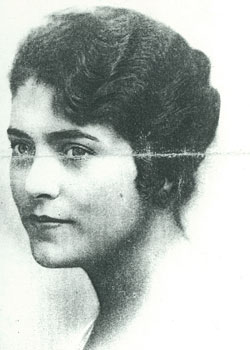 ISABEL,
with singing her main interest, seemed destined to follow in Caroline's footsteps.
They did appear together with bass Harry Dearth in the Faust trio.
Beecham, who conducted, said: "Isabel has a most promising voice." But
Bell happened to be a ravishing beauty, the object of much male attention,
who abandoned singing when she married George Cousins, son of the Lord Mayor
of Portsmouth.
She moved easily into high society, quickly settling into the role of grand
country dame, becoming the most sophisticated of the Hatchard girls.
ISABEL,
with singing her main interest, seemed destined to follow in Caroline's footsteps.
They did appear together with bass Harry Dearth in the Faust trio.
Beecham, who conducted, said: "Isabel has a most promising voice." But
Bell happened to be a ravishing beauty, the object of much male attention,
who abandoned singing when she married George Cousins, son of the Lord Mayor
of Portsmouth.
She moved easily into high society, quickly settling into the role of grand
country dame, becoming the most sophisticated of the Hatchard girls.
During World War II, her only son John was serving with the garrison at Hong
Kong when it surrendered to the Japanese; subsequently, he was aboard a transport
bound for Japan when it was torpedoed by an American submarine. Bell was spared
this ultimate sorrow, having passed away in 1934.
Caroline left the stage in the early thirties to teach at the Royal Academy
of Music. A famous pupil, contralto Helen Watts, recalls: "Her way of
teaching was simply by example. She would rise in a stately manner from her
chair by the
accompanist and show me how to breathe. She would then sing a phrase and I
would be expected to copy it. This may seem an extraordinarily haphazard way
of teaching
but it proved ideal for a young voice and when three years later, she handed
me on to another teacher of her choice, my voice had matured enough to accept
the much more technical training I was then subjected to. Looking back on those
early years of training, I realize I have much to be eternally grateful for
in that Caroline provided me with such a gentle introduction to vocal technique.
Anyway, she was such a lovely person and I was devoted to her."
During the second war, she was at home in London when a German bomb flattened
two houses nearby and badly rattled her own. She was lucky. Twenty years later,
Ewen was at work upstairs when he heard a rumbling and clatter below, then
his mother calling up, urging him to cease whatever he was doing. With a horrendous
roar the ceiling plaster, loosened years earlier by the bomb, came crashing
down.
She was lucky again for if she had remained seated, she would surely have been
crushed. In 1946 Robert suffered a fatal attack while enjoying his weekly game
of golf.
As teacher and adjudicator, she kept active within Britain's musical scene
to the end. The last hurrah came on 22nd June 1969 at a Beecham
lecture in the Garden Crush Bar when, after her record of the Hoffmann Doll
Song was played, the audience rose in unison to applaud as she took her final
bow.
In her eighty-eighth year, she died on 7th January 1970.
From the evidence, she was a superb vocalist who could have become one of England's
greatest contributions to world stages, if conditions had been different.
As for her records, she viewed the recording process with distaste, saying
it could not possibly preserve her voice truthfully. But she made 27 discs,
21 being
released. In spite of her misgivings, they reveal a lyric soprano with a full
and easy coloratura that produces a zest and vigour causing music to spring
to life. They contain some of the loveliest sounds ever to emerge from a female
throat.
Exceedingly rare, discs located to date inevitably are worn by much loving
play. Oddly enough, Caroline once owned a set of her centre-start Pathés,
all unplayed, which she handed over without hesitation during a wartime salvage
drive.
Recently Ewen Langford has managed to prepare a CD containing all of his mother's
discs, copied at exact speed thus ensuring she sings in perfect pitch. Even
with the sonic imperfections, what a joy she is to hear! Surely a commercial
release
is approaching.
DELETED ITEMS:
There once was a soprano named Caroline
A Victorian lass she sang just fine
Three of her sisters cried
While Ma and Pa sighed
Proud Portsmouth said, "Come and dine."
It was the year 1907. A tense atmosphere prevailed in Portsmouth since HM King
Edward VII had launched England's first Dreadnought class battleship on 10
February 1906. As the ship's fitting progressed, international intrigue was
the order
of the day, with deals made, then quickly broken, angry words exchanged and
ill-conceived action, all culminating in that awful conflagration, known with
some irony as
the "great" war.















 After debuting in London as a soprano in 1885, Liza Lehmann
had proceeded to carve a nice niche for herself, but in 1894
she
abandoned all that, ostensibly to marry Herbert Bedford. Actually
she wished to compose music. It was a wise decision for in
just two years, she had crafted a song cycle, "In a Persian
Garden," that had instant appeal.
After debuting in London as a soprano in 1885, Liza Lehmann
had proceeded to carve a nice niche for herself, but in 1894
she
abandoned all that, ostensibly to marry Herbert Bedford. Actually
she wished to compose music. It was a wise decision for in
just two years, she had crafted a song cycle, "In a Persian
Garden," that had instant appeal.  Noticing
a casting weakness in his Hoffmann, Beecham
decided Caroline would make a better Olympia. Later she recalled
a rehearsal, "I
was standing frozen and unable to look at the conductor, singing
contentedly when the music suddenly began to fall apart! I felt
a sudden sense of panic. Then I heard the doll's mechanism being
rewound and almost immediately, the music underwent a change.
There was more zip and I could again detect a clear beat to follow.
I stole a glance at the podium and saw Beecham had appeared to
relieve his floundering colleague." Joining the cast on
7 June, she sang Olympia 22 times that summer.
Noticing
a casting weakness in his Hoffmann, Beecham
decided Caroline would make a better Olympia. Later she recalled
a rehearsal, "I
was standing frozen and unable to look at the conductor, singing
contentedly when the music suddenly began to fall apart! I felt
a sudden sense of panic. Then I heard the doll's mechanism being
rewound and almost immediately, the music underwent a change.
There was more zip and I could again detect a clear beat to follow.
I stole a glance at the podium and saw Beecham had appeared to
relieve his floundering colleague." Joining the cast on
7 June, she sang Olympia 22 times that summer.  In 1914, she discovered the exotic, richly-textured music of Samuel Coleridge-Taylor
singing excerpts of his Hiawatha and A Tale of Old Japan in Bournemouth.
Three years earlier the composer had given an Alfred Noyes poem such vividly
coloured music that he remarked to his wife, "We'll have a motor car yet,
Jess, out of `A Tale of Old Japan'." Sadly, it was not to be, for
C-T died in 1912, aged 37. At his funeral, friend bass Julien Henry sang the
composer's own "When I am dead, my dearest." Caroline never forgot
C-T's music and chose Hiawatha as the pièce de resistance for
her stage farewell in Liverpool on 17 November 1931.
In 1914, she discovered the exotic, richly-textured music of Samuel Coleridge-Taylor
singing excerpts of his Hiawatha and A Tale of Old Japan in Bournemouth.
Three years earlier the composer had given an Alfred Noyes poem such vividly
coloured music that he remarked to his wife, "We'll have a motor car yet,
Jess, out of `A Tale of Old Japan'." Sadly, it was not to be, for
C-T died in 1912, aged 37. At his funeral, friend bass Julien Henry sang the
composer's own "When I am dead, my dearest." Caroline never forgot
C-T's music and chose Hiawatha as the pièce de resistance for
her stage farewell in Liverpool on 17 November 1931.  ISABEL,
with singing her main interest, seemed destined to follow in Caroline's footsteps.
They did appear together with bass Harry Dearth in the Faust trio.
Beecham, who conducted, said: "Isabel has a most promising voice." But
Bell happened to be a ravishing beauty, the object of much male attention,
who abandoned singing when she married George Cousins, son of the Lord Mayor
of Portsmouth.
She moved easily into high society, quickly settling into the role of grand
country dame, becoming the most sophisticated of the Hatchard girls.
ISABEL,
with singing her main interest, seemed destined to follow in Caroline's footsteps.
They did appear together with bass Harry Dearth in the Faust trio.
Beecham, who conducted, said: "Isabel has a most promising voice." But
Bell happened to be a ravishing beauty, the object of much male attention,
who abandoned singing when she married George Cousins, son of the Lord Mayor
of Portsmouth.
She moved easily into high society, quickly settling into the role of grand
country dame, becoming the most sophisticated of the Hatchard girls.